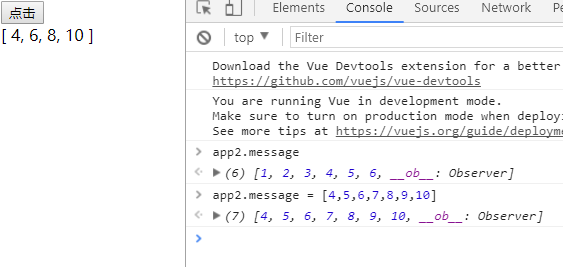您好,登錄后才能下訂單哦!
您好,登錄后才能下訂單哦!
本篇文章給大家分享的是有關Vue中TodoList如何使用,小編覺得挺實用的,因此分享給大家學習,希望大家閱讀完這篇文章后可以有所收獲,話不多說,跟著小編一起來看看吧。
1. methods
methods類似react中組件的方法,不同的是vue采用的與html綁定事件。
給個例子
/*html*/ <input type="button" value="點擊" v-on:click='handlClick' id="app">
/*js*/
var app = new Vue({
el:'#app',
methods:{
handlClick:function(){
alert('succeed!');
},
}
})通過在input標簽中的vue命令 v-on命令綁定handlClick事件,而handlClick事件是寫在methods屬性里的
2. computed
/*html*/
<div id="app2">{{even}}</div>/*js*/
var app2 = new Vue({
el:'#app2',
data:{
message:[1,2,3,4,5,6]
},
computed:{
even:function(){ //篩選偶數
return this.message.filter(function(item){
return item%2 === 0;
});
},
},
});可以看到篩選出來了message中的偶數,現在在控制臺打印出message看看

可以看到,message并沒有變,還是原來的message,然后在控制臺中修改message試試,

修改后我并沒有人為的觸發任何函數,左邊的顯示就變成了新的數組的偶數選集
3. 區別
methods是一種交互方法,通常是把用戶的交互動作寫在methods中;而computed是一種數據變化時mvc中的module 到 view 的數據轉化映射。
簡單點講就是methods是需要去人為觸發的,而computed是在檢測到data數據變化時自動觸發的,還有一點就是,性能消耗的區別,這個好解釋。
首先,methods是方式,方法計算后垃圾回收機制就把變量回收,所以下次在要求解篩選偶數時它會再次的去求值。而computed會是依賴數據的,就像閉包一樣,數據占用內存是不會被垃圾回收掉的,所以再次訪問篩選偶數集,不會去再次計算而是返回上次計算的值,當data中的數據改變時才會重新計算。簡而言之,methods是一次性計算沒有緩存,computed是有緩存的計算。
4. TodoList例子
看了一下Vue官網的todo例子,好像沒有篩選功能,所以就寫了有個篩選功能的例子,下面代碼中,@click的意思是v-on='click'的簡寫,:class=的意思是v-bind:'class'=的簡寫
<!doctype html> <html lang="en"> <head> <meta charset="UTF-8"> <title>todos</title> <script src="https://cdn.bootcss.com/vue/2.4.2/vue.js"></script> <style> .wrap{ width: 400px; background-color: #ccc; margin: 0 auto; } i{ color: #f00; font-size: 12px; margin-left: 20px; cursor: pointer; } i:hover{ font-weight: 700; } ol{ /*white-space: nowrap;*/ word-wrap:break-word; } .done{ text-decoration: line-through; } .not{ } </style> </head> <body> <div class="wrap" id="todos"> <input type="text" v-model='nextItem' @keyup.enter='append'> <button id="append" @click='append'>添加</button> <ol> <li v-for='(item,index) of comp' :key=item.id :class='item.state ? "not" : "done"'> {{item.text}} <i @click='remove(index)'>完成</i> </li> </ol> <button @click='all'>全部</button> <button @click='done'>已完成</button> <button @click='todos'>待完成</button> </div> </body> <script> var todos = new Vue({ el:'#todos', data:{ nextItem: '', nextID: 1, list: [], type: null, }, computed:{ comp:function(){ if( this.type === 0 ){ return this.list; } else if(this.type === 1){ //show all return this.list.filter(function(item){ return true; }) } else if(this.type === 2){ //done return this.list.filter(function(item){ return item.state ? false : true; }) } else if(this.type === 3){ //todos return this.list.filter(function(item){ return item.state ? true : false; }) } } }, methods:{ append:function(){//添加到todo this.list.push({ id:this.nextID++, text:this.nextItem, state: true, }); this.nextItem = ''; this.type = 0; }, remove:function(index){ //添加到donelist this.list[index].state = !this.list[index].state; }, all:function(){ this.type = 1; }, done:function(){ this.type = 2; }, todos:function(){ this.type = 3; } } }); </script> </html>
以上就是Vue中TodoList如何使用,小編相信有部分知識點可能是我們日常工作會見到或用到的。希望你能通過這篇文章學到更多知識。更多詳情敬請關注億速云行業資訊頻道。
免責聲明:本站發布的內容(圖片、視頻和文字)以原創、轉載和分享為主,文章觀點不代表本網站立場,如果涉及侵權請聯系站長郵箱:is@yisu.com進行舉報,并提供相關證據,一經查實,將立刻刪除涉嫌侵權內容。